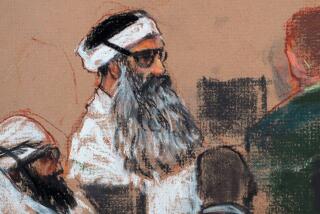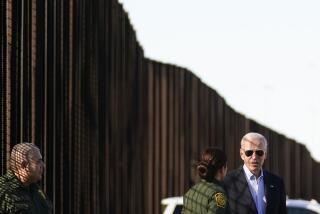Judge orders 5 detainees to be freed
WASHINGTON — A federal judge ruled here for the first time Thursday that the Bush administration had no basis for holding several of its long-term prisoners at Guantanamo Bay, Cuba, and he ordered that five of the Algerian natives go free.
The question in the case was whether the men, who lived in Bosnia and had never fought or been near a battlefield, had plotted with Al Qaeda and were planning to fight in Afghanistan. In Thursday’s ruling, U.S. District Judge Richard Leon, a Bush appointee, said the government’s case was weak because it relied on only one unnamed witness who linked the men to Al Qaeda. They deserve to be released, he said.
“This is a good day for the American justice system,” said Robert C. Kirsch, part of a team of Boston lawyers who spent much of the last seven years trying to win the Algerian men their freedom. “They were swept up by mistake. This is remarkable because Judge Leon essentially told the government, you don’t have a case and you never had a case against these men.”
Leon had earlier decided that the Guantanamo prisoners had no right to seek their freedom in court. The Supreme Court in June overruled that decision in the case of Lakhdar Boumediene vs. Bush and said the Guantanamo prisoners had the right to habeas corpus -- to be heard by a judge. However, despite years of litigation, no prisoner at Guantanamo has been released as a result of a judge’s order.
In the fall of 2001, the Algerian-born men whose case was decided Thursday were suspected of plotting to bomb the U.S. Embassy in the Bosnian capital of Sarajevo. But a court in Bosnia rejected the allegation and released the men. Then, U.S. authorities took them into custody and shipped them to the U.S. naval base at Guantanamo Bay.
In January 2002, President Bush referred to the case in his State of the Union address. “Our soldiers, working with the Bosnian government, seized terrorists who were plotting to bomb our embassy,” he said.
But when the case went before the judge, the administration’s lawyers dropped that claim. Instead, they asserted that the Algerians planned to travel to Afghanistan to take up arms against U.S. forces. Leon concluded there was little or no evidence to prove the men made such a plan.
However, he ruled Thursday that one of six Algerians, Bensayah Belkacem, was linked to Al Qaeda and could be held indefinitely as an “enemy combatant.”
It is not certain that the ruling Thursday will force the government to release the five men. The Justice Department can appeal to the U.S. Court of Appeals in Washington, and that could easily delay a decision. The appeals court has generally endorsed the Bush administration’s policies.
But President-elect Barack Obama has said he intends to close the Guantanamo prison. Civil libertarians expect that most of its remaining 250 detainees will be released.
Peter Carr, a Justice Department spokesman, said he was disappointed with Thursday’s ruling but stopped short of saying it would be appealed. He said the case of the Algerian men involved “extraordinary circumstances where wartime enemies have been captured abroad” and were held based on classified information. His statement suggested the judge had failed to give full weight to the classified evidence. “We are promptly reviewing the decision” before deciding on an appeal, he said.
Civil libertarians said Thursday’s decision confirmed what the Bush administration’s critics had long assumed -- that the cases against the Guantanamo prisoners would not stand up if they were examined by an independent judge.
“For seven years, the Bush administration sought to avoid the courts because it had no evidence and sought instead to create a lawless prison,” said Vincent Warren, executive director of the Center for Constitutional Rights. “We must note that justice here, however, comes seven years too late.”
In its ruling in June, the Supreme Court told judges in Washington to move promptly to review the cases of the scores of Guantanamo prisoners who had filed habeas corpus claims. Leon and several other judges have taken up that task, but it has been slow going. The high court said the government could hold an “enemy combatant,” but it did not define exactly who qualified.
Last month, another federal judge ruled that 17 Chinese Muslims held at Guantanamo should be released, but in that case, the administration had conceded the prisoners were not enemy combatants.
However, their release has foundered on the question of where they can go. The Chinese Muslims could not be returned to China because they faced persecution there, and the Bush administration objected to releasing them in the United States. Their case goes back before the appeals court next week.
--
More to Read
Sign up for Essential California
The most important California stories and recommendations in your inbox every morning.
You may occasionally receive promotional content from the Los Angeles Times.











